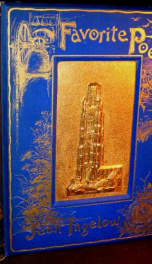Ingelow Jean

Jean Ingelow (17 March 1820 – 20 July 1897), was an English poet and novelist. Born at Boston, Lincolnshire, she was the daughter of William Ingelow, a banker. As a girl she contributed verses and tales to magazines under the pseudonym of Orris, but her first (anonymous) volume, A Rhyming Chronicle of Incidents and Feelings, did not appear until her thirtieth year. This was called charming by Alfred Tennyson, 1st Baron Tennyson who declared he should like to know the author; they later became friends. Jean Ingelow followed this book of verse in 1851 with a story, Allerton and Dreux, but it was the publication of her Poems in 1863 which suddenly made her a popular writer. They ran rapidly through numerous editions, were set to music, and sung in every drawing-room, and in the United States obtained even greater public acclaim. In 1867 she published The Story of Doom and other Poems, and then gave up verse for a while and became industrious as a novelist. Off the Skelligs appeared in 1872, Fated to be Free in 1873, Sarah de Berenger in 1880, and John Jerome in 1886. She also wrote Studies for Stories (1864), Stories told to a Child (1865), Mopsa the Fairy (1869), and other stories for children. Mopsa the Fairy, about a boy who discovers a nest of fairies and discovers a fairyland while riding on the back of a pelican) was one of her most popular works (it was reprinted in 1927 with illustrations by Dorothy Lathrop).[1] Anne Thaxter Eaton, writing in ‘’ ‘’A Critical History of Children's Literature’’, calls the book “a well-constructed tale,” with “charm and a kind of logical make-believe.”[1] Her third series of Poems was published in 1885. The last years of her life were spent in Kensington, and she outlived her popularity as a poet. Her poems, collected in one volume in 1898, have often the genuine ballad note, and her songs were exceedingly successful. "Sailing beyond Seas" and "When Sparrows build in Supper at the Mill" were among the most popular songs of the day; but they share, with the rest of her work, the faults of affectation and stilted phraseology. Her best-known poem was the "High Tide on the Coast of Lincolnshire". The blemishes of her style were cleverly indicated in a well-known parody by Charles Stuart Calverley; a false archaism and a deliberate assumption of unfamiliar and unnecessary synonyms for simple objects were among the worst of her mannerisms. Postmodern novelist Gilbert Sorrentino, in his satirical novel Blue Pastoral (1983), lampooned her "Supper at the Mill," a poem cast in the form of a dramatic vignette, as "Supper at the Kind Brown Mill." She wrote, however, with a sweetness of sentiment, and in prose she displayed feeling for character and the gift of narrative; a delicate underlying tenderness is never wanting in either medium. She was a woman of frank and hospitable manners, with a look of the Lady Bountiful of a country parish. She had nothing of the professional authoress or the literary lady about her, and, as with characteristic simplicity she was accustomed to say, was no great reader. Her temperament was rather that of the improvisatore than of the professional author or artist. Ingelow died in 1897 and is buried in Brompton Cemetery, London.
do you like this author?
What readers are saying
What do you think? Write your own comment on this book!
write a commentWhat readers are saying
What do you think? Write your own comment on this author!
write a commentBook list

studies for stories
Series:
Unknown
Year:
Unknown
Raiting:
5/5
Purchase of this book includes free trial access to www.million-books.com where you can read more than a million books for free. This is an OCR edition with typos. Excerpt from book: THE CUMBERERS. CHAPTER I.THE MISSES PERKINS. years ago, while staying at the sea-side, my parents renewed their acquaintance with some ladies, whom we will call the Misses Perkins. They were the daughters of a clergyman deceased, and had a slender competence, on which they not only kept up a creditable appearance, but were charitable and useful. It happened that, shortly before returning home, my parents remarked, in presence of these ladies, that they had intended to leave me behind for a time, because my health was delicate, but that some change of plan prevented the family with whom I was to have been domesticated from receiving me. Hereupon significant looks passed between the sisters, and the next day a note arrived, which set forth, that though the Misses Perkins were not in the habit of receiving boardersfar from it,yet on this occasion they should be happy to step out of their usual path, and accommodate the daughter of their old friend. Accordingly, I was sent to their house, and the ladiesthat is, some of themtook care that I should derive all the benefit that care and kindness could secure to me. The Misses Perkins covenanted to provide me with sea air, and, besides that, they provided me with many speculations on human life; on the Providence which throws certain characters together; the changes they are intended to work on one another ; the place each is fitted to fill in this world; the reason why some ,are privileged to be almost always helpers, while others are suffered to be uniformly hinderers; and the cause why some, as it seems, are compelled to exert themselves so much, while others, it is evident, are determined to do so little. But did the Misses Perkins intend to teach me all this? Certainly not; they were by no means metaphys...
Show more
add to favoritesadd In favorites

stories told to a child
Series:
Unknown
Year:
Unknown
Raiting:
4.5/5
Thirteen stories including the interesting "Nineteen Hundred and Seventy Two" futuristic story.
Show more
add to favoritesadd In favorites
Book list

studies for stories
Series:
Unknown
Year:
Unknown
Raiting:
5/5
Purchase of this book includes free trial access to www.million-books.com where you can read more than a million books for free. This is an OCR edition with typos. Excerpt from book: THE CUMBERERS. CHAPTER I.THE MISSES PERKINS. years ago, while staying at the sea-side, my parents renewed their acquaintance with some ladies, whom we will call the Misses Perkins. They were the daughters of a clergyman deceased, and had a slender competence, on which they not only kept up a creditable appearance, but were charitable and useful. It happened that, shortly before returning home, my parents remarked, in presence of these ladies, that they had intended to leave me behind for a time, because my health was delicate, but that some change of plan prevented the family with whom I was to have been domesticated from receiving me. Hereupon significant looks passed between the sisters, and the next day a note arrived, which set forth, that though the Misses Perkins were not in the habit of receiving boardersfar from it,yet on this occasion they should be happy to step out of their usual path, and accommodate the daughter of their old friend. Accordingly, I was sent to their house, and the ladiesthat is, some of themtook care that I should derive all the benefit that care and kindness could secure to me. The Misses Perkins covenanted to provide me with sea air, and, besides that, they provided me with many speculations on human life; on the Providence which throws certain characters together; the changes they are intended to work on one another ; the place each is fitted to fill in this world; the reason why some ,are privileged to be almost always helpers, while others are suffered to be uniformly hinderers; and the cause why some, as it seems, are compelled to exert themselves so much, while others, it is evident, are determined to do so little. But did the Misses Perkins intend to teach me all this? Certainly not; they were by no means metaphys...
Show more
add to favoritesadd In favorites

stories told to a child
Series:
Unknown
Year:
Unknown
Raiting:
4.5/5
Thirteen stories including the interesting "Nineteen Hundred and Seventy Two" futuristic story.
Show more
add to favoritesadd In favorites

mopsa the fairy
Series:
Unknown
Year:
Unknown
Raiting:
3/5
Welcome to a magical fairy world of Jean Ingelow, a nineteenth century English poet and novelist, who had above all a wide popular success among the youngest readers. One of his children’s stories, Mopsa the Fairy is a bright example of his skill. This celebrated fantasy describes the adventures of an ordinary boy, who encounters a nest of fairies. Jack, a mortal, kisses Mopsa, and as a result she does not grow into maturity but remains a child along with Jack until eventually she becomes the powerful ruler of a fairy land.
Show more
add to favoritesadd In favorites

don john a novel
Series:
Unknown
Year:
Unknown
Raiting:
2.5/5
This volume is produced from digital images created through the University of Michigan University Library's preservation reformatting program. The Library seeks to preserve the intellectual content of items in a manner that facilitates and promotes a variety of uses. The digital reformatting process results in an electronic version of the text that can both be accessed online and used to create new print copies. This book and thousands of others can be found in the digital collections of the University of Michigan Library. The University Library also understands and values the utility of print, and makes reprints available through its Scholarly Publishing Office.
Show more
add to favoritesadd In favorites

a story of doom and other poems
Series:
Unknown
Year:
Unknown
Raiting:
5/5
POEMS.THE DREAMS THAT CAME TRUE,SAW in a vision once, onr mother-sphere The world, her fixed foredoomed ovai tracing,Rolling and rolling on and resting never, While like a phantom fell, behind her pacing The unfurled flag of night, her shadow drear Fled ax she fled and hung to her for ever.Great Heaven ! mcthoiight, how strange a doom to share.Would I may never bearInevitable, darkness after me (Darkness endow'd with drawings strong,And shadowy hands that cling unendingly),Nor fee) that phantom-wings behind me sweep, As she feels night pursuing through the longIllimitable reaches of (the vasty deep/Table of Contents College; CONTENTS; THE DREAMS THAT CAME THUK SONGS C>> Tilt-: VOICES Of BlilBS IAUIUKCK ; SONGS UK THE NIGHT WATCHES A STORY OF DOOM CONTRASTED SDNGS filAliVtj AND IIKU tSlAN')» SONGS WITH rRELUDHS WINSTANI-KY About the Publisher Forgotten Books is a publisher of historical writings, such as: Philosophy, Classics, Science, Religion, History, Folklore and Mythology.Forgotten Books' Classic Reprint Series utilizes the latest technology to regenerate facsimiles of historically important writings. Careful attention has been made to accurately preserve the original format of each page whilst digitally enhancing the difficult to read text. Read books online for free at www.forgottenbooks.org
Show more
add to favoritesadd In favorites

Wonder-Box Tales
Series:
Unknown
Year:
Unknown
Raiting:
4/5
Jean Ingelow was an English poet and novelist. The publication of her Poems in 1863 suddenly made her a popular writer. They ran rapidly through numerous editions, were set to music, and sung in every drawing-room, and in the United States obtained even greater public acclaim. In 1867 she published The Story of Doom and other Poems, and then gave up verse for a while and became industrious as a novelist. Off the Skelligs appeared in 1872, Fated to Be Free in 1873, Sarah de Berenger in 1880, and John Jerome in 1886. She also wrote Studies for Stories (1864), Stories told to a Child (1865), Mopsa the Fairy (1869), and other excellent stories for children. Her third series of Poems was published in 1885. The last years of her life were spent in Kensington, and she outlived her popularity as a poet. --This text refers to an alternate Paperback edition.
Show more
add to favoritesadd In favorites

Poems by Jean Ingelow, In Two Volumes, Volume II.
Series:
Unknown
Year:
Unknown
Raiting:
1/5
A 1896 collection of poems, songs and hymns by an English poet and novelist of the nineteenth century Jean Ingelow.
Show more
add to favoritesadd In favorites

Poems by Jean Ingelow, In Two Volumes, Volume I.
Series:
Unknown
Year:
Unknown
Raiting:
4.5/5
"Excerpt from the book..."An empty sky, a world of heather, Purple of foxglove, yellow of broom;We two among them wading together, Shaking out honey, treading perfume.
Show more
add to favoritesadd In favorites

Fated to Be Free
Series:
Unknown
Year:
Unknown
Raiting:
3.5/5
Purchase of this book includes free trial access to www.million-books.com where you can read more than a million books for free. This is an OCR edition with typos. Excerpt from book: CHAPTER III. GOLD, THE INCORRUPTIBLE WITNESS. Accipe Hoc. AFTER she had received the promise she desired from her sonsa promise burdened with so strange a conditionMadam Melcombe seemed to lose all the keenness and energy she had displayed at first. She had desired above all things that honour should be shown to her in her death;, her mind often occupied itself with strange interest and pertinacity on the details, of her funeral. All her wishes respecting it had long been known to her granddaughters, but her eldest surviving son had never been mentioned by name to them. She always spoke of him as " the chief mourner." Suddenly, howeve'r, it appeared to have occurred to her that he might not be present at it, after all. Everything must be risked to ascertain this. She must write, she must entreat his presence. But when he and his brother sent in their cards she, for the first time in her life, perceived that all she had done was useless. She saw the whole meaning of the situation ; for this estate had come to her through the failure of heirs male to her father, and it was the provision of' his will that she and her heirs should take back his namethe name of Melcombe. She knew well that these two sons had always retained their father's name ; but when they sent itin to her, she instinctively perceived their meaning. They were calling her attention to the fact, and she was sure now that they never meant to change it. She had not behaved kindly or justly to her grandson's widow, for people had called little Peter her heir, and she had not contradicted them. But she had never made a will; and she secretly hoped that at the last something would occur to prevent her doing so. Everything was absolutely in her own power, to leave as she pleased ; but a half superst...
Show more
add to favoritesadd In favorites
What readers are saying
What do you think? Write your own comment on this author!
write a commentGenre
- Literature & Fiction
- Literature & Fiction / Contemporary
- Books / English poetry
- Literature & Fiction / Genre Fiction / Fairy Tales
- Religion & Spirituality / Christianity / Literature & Fiction / Fiction
- Literature & Fiction / Poetry / Anthologies
- Literature & Fiction / History & Criticism
- Biographies & Memoirs / Ethnic & National / Jewish
- Nonfiction / Education / Education Theory / History
if you like Ingelow Jean try:
readers also enjoyed
What readers are saying
What do you think? Write your own comment on this author!
write a commentGenre
- Literature & Fiction
- Literature & Fiction / Contemporary
- Books / English poetry
- Literature & Fiction / Genre Fiction / Fairy Tales
- Religion & Spirituality / Christianity / Literature & Fiction / Fiction
- Literature & Fiction / Poetry / Anthologies
- Literature & Fiction / History & Criticism
- Biographies & Memoirs / Ethnic & National / Jewish
- Nonfiction / Education / Education Theory / History
if you like Ingelow Jean try:
readers also enjoyed
Do you want to read a book that interests you? It’s EASY!
Create an account and send a request for reading to other users on the Webpage of the book!




